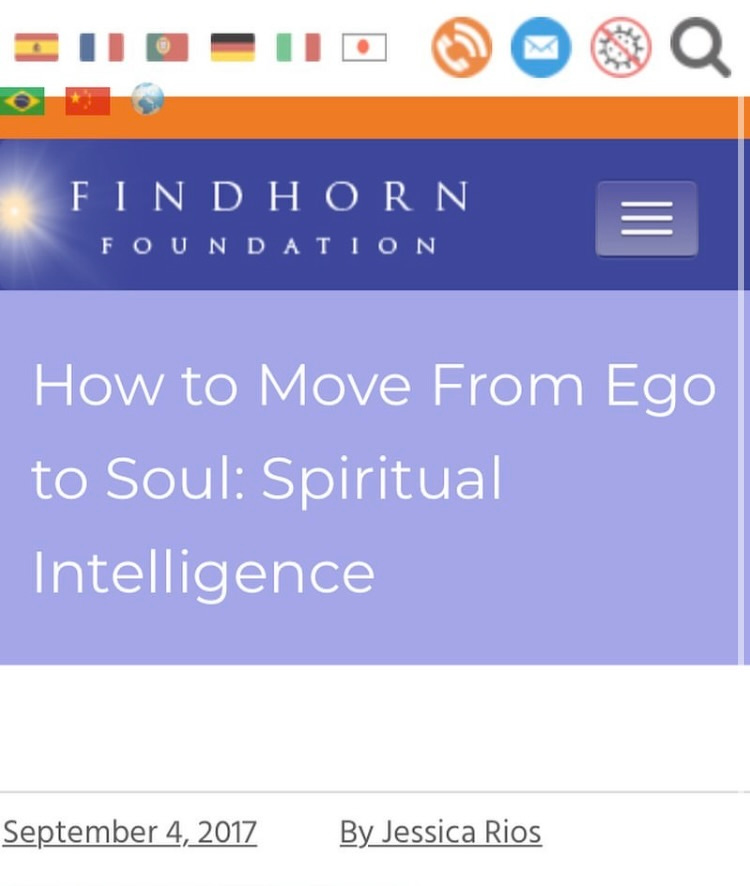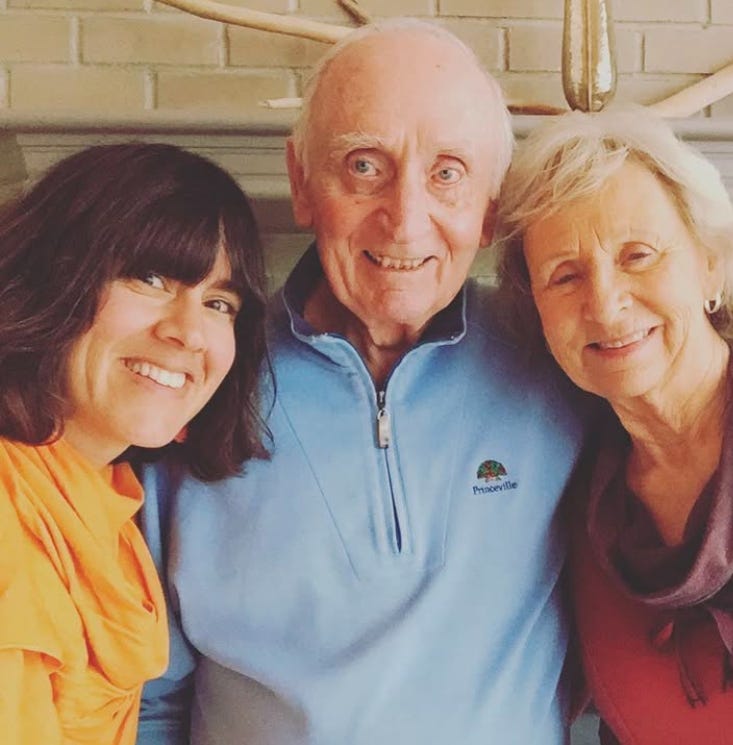An Introduction to Spiritual Intelligence
listening to and living from the inner tug
Yesterday I found two pieces of writing from 2017 that I feel moved to share with you today. One of them, How to Move from Ego to Soul: Spiritual Intelligence, is hiding somewhere in boxes of piled-up paper. The other is here, An Introduction to Spiritual Intelligence.
An Introduction to Spiritual Intelligence ✨
By Jessica Rios
Originally published by the Findhorn Foundation, 12 August 2017
Have you ever wondered what life on Planet Earth might be like in 100 years, when maybe, just maybe, humanity has reached a point of valuing spiritual intelligence (SQ) as much as we seem to value rational intelligence (IQ)?
We have barely begun valuing emotional intelligence (EQ) — so how long might it take before we value what is seen as yet another essential leap into the intelligence and potential of humanity: spiritual intelligence?
With the future being unpredictable, that question may be less helpful than those presenting themselves more readily in the here and now. What is SQ? And as for our own inner questioning, how does each of us embrace it more fully in our own lives?
What Is Spiritual Intelligence?
Exhibiting our human grappling with this relatively new area of study, many definitions have been presented for SQ. Whereas IQ is associated with the left brain, and EQ with the right brain, SQ is noted as a “third way” of human intelligence — one that includes the transcendent, existential aspects of living in a human body.
Perhaps the most succinct definition comes from Richard Griffiths, former National Chairman of the Transpersonal Psychology section of the Australian Psychological Society, who says:
“Spiritual intelligence equals IQ and EQ exercised with presence.”
Griffiths defines presence as the movement of awareness from ego to soul.
The term Spiritual Intelligence was coined in 1997 by Danah Zohar when she introduced the concept in her book Rewiring the Corporate Brain. Considered one of the world’s great thinkers in the realm of management, Zohar studied Physics and Philosophy at MIT and completed postgraduate work in Philosophy, Religion, and Psychology at Harvard.
Definitions of SQ typically distinguish spirituality from religiosity, equating SQ with existential intelligence. In his 2004 book The 8th Habit: From Effectiveness to Greatness, Stephen Covey wrote:
“Spiritual intelligence is the central and most fundamental of all the intelligences, because it becomes the source of guidance for the others.”
How We Measure It (and Why It Matters)
While there is yet no universally agreed-upon method of measuring SQ, principles often include: valuing other people for their differences (not despite them), self-awareness, spontaneity, positive use of adversity, bilateral respect in relationships, tranquility regardless of workload, the ability to utilize spiritual resources to solve problems, and ego self-mastery.
Since this piece was first written, several researchers and practitioners have continued refining ways to understand and even measure SQ. Cindy Wigglesworth’s SQ21 framework and David B. King’s SISRI-24 remain two leading models, both used in leadership, coaching, and psychological research. While consensus around measurement is still emerging, the practical integration of SQ into education, leadership, and organizational development has expanded notably in the last decade.
A Personal Story
Reflecting on how SQ might have touched my life, I am reminded of a noteworthy moment in 1997 during my last year of college when something called to me about Hawai’i. From someplace deep within me, I wanted to go. And I wanted to go all by myself.
In my mind I recalled images of endless, lush greenery. Specifically, Kaua’i, I had heard, was “the most beautiful place on Earth.”
Some close friends had traveled alone, but in my family this wasn’t common for a person my age. My sister was concerned. My dad was concerned. I was cautioned against it. Still I felt called to go.
While there were left-brain (IQ-related) reasons supporting my longing — such as knowing it was part of the USA and that English was spoken — I could have also followed the advice of the TV media: Don’t travel alone; it isn’t safe; stay close to home; bad things happen to good people. What if…? What if…? What if…?
Those messages simply didn’t resonate. There was a tug too strong in my heart urging me to listen. From an EQ perspective, my feeling of trust that it would work out just fine took center stage.
Very clearly there was a feeling in my heart that knew I was safe. Without dissecting the elements of SQ that may have been involved — intermingling with the IQ and EQ in the dance of this decision — I do believe it was SQ that allowed this to become a defining moment in the rest of my life.
Sure enough, though I stayed only with ‘strangers’ and went with very little money, it took less than a week for one of the most life-changing experiences of my life to occur. Almost as in a dream state, I found myself sitting in the living room of a man who is internationally renowned for his spiritual clarity — a teacher of forgiveness who became a dedicated spiritual mentor and friend to me over the last 20 years. Tom Carpenter passed on May 8, 2020. This photo was taken in ~2008 when I visited him and his wife Linda at their home in Port Ludlow, Washington.
Something tells me it was this deep-rooted sense of safety — an unwavering sense of certainty in who I am rather than what I am being in this moment or that moment, the connection I had to my own soul, the refusal to buy into messages of fear — that led to this experience.
Had I listened only to left- or right-brain information, I might have had a great trip. But I don’t suspect it would have been epic.
We Are in Good Company
SQ is universal; each of us can access it when we choose to. No one has “a corner on the market,” as my coach likes to remind me.
Whether afraid or not, whether others approve of our explorations or not, when we open up to our own SQ, it smiles back at us like a lavender bush stretching for the sun.
Even as we inhale with the enormity of human suffering on this planet — the atrocities that happen every single day due to our unloving choices — we can exhale in the knowing that there are many, many examples of SQ in our midst.
Although we don’t yet have a firm method for measuring SQ in individuals, hundreds of humans have been widely recognized as having high levels of SQ. Among them are Sri Sri Ravi Shankar, Don Miguel Ruiz, Caroline Myss, Adyashanti, Ram Dass, Paulo Coelho, Clarissa Pinkola Estés, and Gary Snyder.
We do not need to know anyone personally to benefit from the chemistry exchanged between us. Reading a book by someone who embodies SQ, or listening to a talk in person or online, are both good ways to enhance our sense of spiritual wisdom. Expanding SQ is readily available through one moment’s choice to be present and attentive to our own spiritual wisdom — and then the next.
A Closing Reflection
May we all find ways to engage playfully — and even engage a bit of spiritual mischief — with our own SQ, inviting it to surface from our wise inner depths before we have a chance to think too hard about it.
A simple question I like to ask myself sometimes, when faced with a difficult situation such as conflict with a loved one, is:
How would my spiritual self guide me here?
It is almost shocking how quickly we can seem to trick ourselves out of fear-based thoughts, turning instead to our own timeless wisdom.
© Jessica Rios. Originally published by the Findhorn Foundation (2017). Lightly updated in 2025.





Listening to the quiet voice inside my chest means letting the louder voices in my head pipe down. Takes surrender.
Love this article. I too felt a calling to Hawaii in 1997 and traveled there alone after my college graduation. It's so important to listen and tap into your inner spirit and listen the voice inside yourself. Great piece!